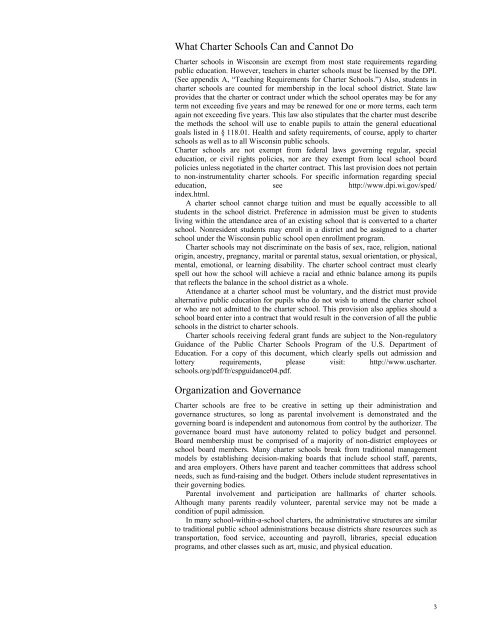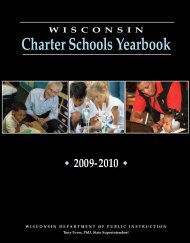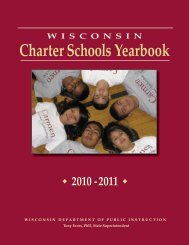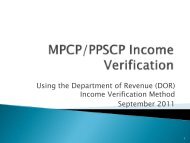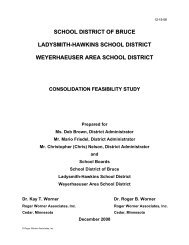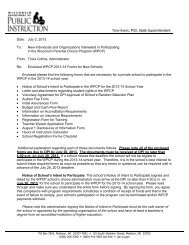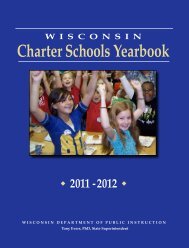Wisconsin Charter Schools Yearbook - School Management Services
Wisconsin Charter Schools Yearbook - School Management Services
Wisconsin Charter Schools Yearbook - School Management Services
You also want an ePaper? Increase the reach of your titles
YUMPU automatically turns print PDFs into web optimized ePapers that Google loves.
What <strong>Charter</strong> <strong><strong>School</strong>s</strong> Can and Cannot Do<br />
<strong>Charter</strong> schools in <strong>Wisconsin</strong> are exempt from most state requirements regarding<br />
public education. However, teachers in charter schools must be licensed by the DPI.<br />
(See appendix A, “Teaching Requirements for <strong>Charter</strong> <strong><strong>School</strong>s</strong>.”) Also, students in<br />
charter schools are counted for membership in the local school district. State law<br />
provides that the charter or contract under which the school operates may be for any<br />
term not exceeding five years and may be renewed for one or more terms, each term<br />
again not exceeding five years. This law also stipulates that the charter must describe<br />
the methods the school will use to enable pupils to attain the general educational<br />
goals listed in § 118.01. Health and safety requirements, of course, apply to charter<br />
schools as well as to all <strong>Wisconsin</strong> public schools.<br />
<strong>Charter</strong> schools are not exempt from federal laws governing regular, special<br />
education, or civil rights policies, nor are they exempt from local school board<br />
policies unless negotiated in the charter contract. This last provision does not pertain<br />
to non-instrumentality charter schools. For specific information regarding special<br />
education, see http://www.dpi.wi.gov/sped/<br />
index.html.<br />
A charter school cannot charge tuition and must be equally accessible to all<br />
students in the school district. Preference in admission must be given to students<br />
living within the attendance area of an existing school that is converted to a charter<br />
school. Nonresident students may enroll in a district and be assigned to a charter<br />
school under the <strong>Wisconsin</strong> public school open enrollment program.<br />
<strong>Charter</strong> schools may not discriminate on the basis of sex, race, religion, national<br />
origin, ancestry, pregnancy, marital or parental status, sexual orientation, or physical,<br />
mental, emotional, or learning disability. The charter school contract must clearly<br />
spell out how the school will achieve a racial and ethnic balance among its pupils<br />
that reflects the balance in the school district as a whole.<br />
Attendance at a charter school must be voluntary, and the district must provide<br />
alternative public education for pupils who do not wish to attend the charter school<br />
or who are not admitted to the charter school. This provision also applies should a<br />
school board enter into a contract that would result in the conversion of all the public<br />
schools in the district to charter schools.<br />
<strong>Charter</strong> schools receiving federal grant funds are subject to the Non-regulatory<br />
Guidance of the Public <strong>Charter</strong> <strong><strong>School</strong>s</strong> Program of the U.S. Department of<br />
Education. For a copy of this document, which clearly spells out admission and<br />
lottery requirements, please visit: http://www.uscharter.<br />
schools.org/pdf/fr/cspguidance04.pdf.<br />
Organization and Governance<br />
<strong>Charter</strong> schools are free to be creative in setting up their administration and<br />
governance structures, so long as parental involvement is demonstrated and the<br />
governing board is independent and autonomous from control by the authorizer. The<br />
governance board must have autonomy related to policy budget and personnel.<br />
Board membership must be comprised of a majority of non-district employees or<br />
school board members. Many charter schools break from traditional management<br />
models by establishing decision-making boards that include school staff, parents,<br />
and area employers. Others have parent and teacher committees that address school<br />
needs, such as fund-raising and the budget. Others include student representatives in<br />
their governing bodies.<br />
Parental involvement and participation are hallmarks of charter schools.<br />
Although many parents readily volunteer, parental service may not be made a<br />
condition of pupil admission.<br />
In many school-within-a-school charters, the administrative structures are similar<br />
to traditional public school administrations because districts share resources such as<br />
transportation, food service, accounting and payroll, libraries, special education<br />
programs, and other classes such as art, music, and physical education.<br />
3


